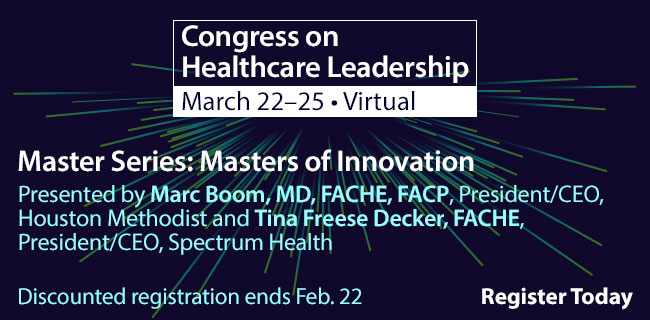
- Program Spotlight:
One Week Left to Register for Congress for Less - New Study: AI to Become Pervasive in Hospital Revenue Cycle by 2023
- Give Back to Your Profession Through ACHE’s Leadership Mentoring Network
- The First Focusing Step: Identifying the Bottleneck
- Accelerating Health Equity: A Virtual Conference
- CMS: Revised Codes Accepted With Cost-Sharing Modifier for COVID-19 Diagnostic Tests
Program Spotlight: One Week Left to Register for Congress for Less
Imagine an all-star line-up of keynote speakers, 100 networking sessions and the chance to earn up to 12 ACHE Face-to-Face Education credits for only $449. Well, you don’t have to imagine, but you do have to act fast to take advantage of early bird pricing for the 2021 Congress on Healthcare Leadership before fees increase next week.
After an extraordinary year, we hope you will join us March 22–25 for a virtual experience that will allow you to connect with your colleagues, discover new insights from innovative thought leaders and access resources that will empower you as a leader. You won’t want to miss out on this unique opportunity to reimagine healthcare, together.
Register by Feb. 22 and save on your all-access pass to the premier educational and networking event for healthcare leaders.
New Study: AI to Become Pervasive in Hospital Revenue Cycle by 2023
Artificial intelligence is poised to transform the way doctors, hospitals and healthcare systems identify, collect and manage their revenue cycle over the next three years, according to a new study by Change Healthcare. Two-thirds of hospital and health system executives report using AI in some revenue cycle capacity, and nearly all expect to be using it pervasively within three years. Among the study’s findings:
- Nearly all U.S. hospitals plan to use AI pervasively across the revenue cycle within three years.
- Stark gaps in opinion are hindering healthcare from fully capitalizing on the transformative power of AI.
- AI is driving a wide range of improvements, but the approach is tactical and not end-to-end.
- Financial, security and privacy concerns continue to hinder AI adoption.
These insights and more are detailed in Poised to Transform: AI in the Revenue Cycle, a national study of 200 revenue cycle, IT, finance and C-suite decision-makers commissioned by Change Healthcare and conducted by market researcher ENGINE Insights.
Download the full report at www.changehealthcare.com/insights/ai-transforms-revenue-cycle-management.
Change Healthcare, an ACHE Premier Corporate Partner, provided the content above.
Give Back to Your Profession Through ACHE’s Leadership Mentoring Network
At ACHE, we believe that no matter where you are in your career, mentoring others—and being mentored—should be part of your professional growth. Becoming a mentor is a great way to give back and develop the future leaders of our field. Our new digital Leadership Mentoring Network provides enhanced matching based on a multitude of criteria and support for successful mentor partnerships. Mentors and mentees can expect to have the classic one-on-one mentoring experience while primarily meeting virtually by phone, video chat, email or through a virtual meeting platform.
In addition to furthering an emerging leader’s career development, mentors stand to gain exposure to fresh perspectives and to learn a bit about themselves, too. We encourage you to explore our Leadership Mentoring Network and complete your mentor profile today.
The First Focusing Step: Identifying the Bottleneck
When identifying a bottleneck in a hospital or healthcare setting, leaders should ask themselves, “Where is the patient census higher than it should be?” In Chapter 2 of their book Smash the Bottleneck: Fixing Patient Flow for Better Care (and a Better Bottom Line), authors Christopher Strear, MD, and Danilo Sirias, PhD, lay out a concrete methodology for identifying the source of a bottleneck. As a whole, the book is meant to help executives get to the root of patient-flow problems and address them quickly using a continuous improvement methodology—the Theory of Constraints. This theory emphasizes identifying, optimizing and breaking down bottlenecks to improve overall system performance—and ties it to healthcare delivery from a practitioner’s point of view.
Order this book today and discover the practical knowledge and tools you can use to break bottlenecks and enact meaningful, lasting change.
Accelerating Health Equity: A Virtual Conference
Are you a leader in community health or diversity and inclusion seeking to share successful action steps and stories with your peers? The Accelerating Health Equity virtual conference, March 16–18, co-hosted by two of the American Hospital Association’s leading networks—AHA Community Health Improvement and the Institute for Diversity and Health Equity—will advance the shared mission of these groups to close health equity gaps, build strategic hospital-community partnerships, and develop and sustain diversity and inclusion efforts in hospitals and health systems. Register today for what promises to be a thought-provoking and inspiring conference.
ACHE is a co-founding organization of the Institute for Diversity and Health Equity.
CMS: Revised Codes Accepted With Cost-Sharing Modifier for COVID-19 Diagnostic Tests
Effective March 18, 2020, the Families First Coronavirus Response Act requires Medicare Part B to cover beneficiary cost-sharing for provider visits when a COVID-19 diagnostic test is administered or ordered, according to the Centers for Medicare & Medicaid Services. CMS updated the list of codes that physicians and nonphysician practitioners can use with the cost-sharing modifier.
For dates of services on or after Jan. 1, 2021, through the end of the pandemic, CMS will accept the following codes with the cost-sharing modifier:
- HCPCS codes G2250, G2251 and G2252
- CPT codes 98970, 98971 and 98972 (These replace HCPCS codes G2061 through G2063, which are accepted for services provided in 2020)
CPT codes 98966, 98967 and 98968 are accepted for services with the cost-sharing modifier provided on or after March 18, 2020.
More information about cost-sharing can be found here.


